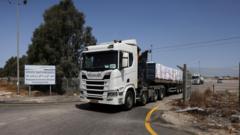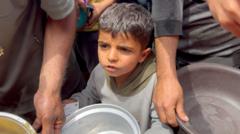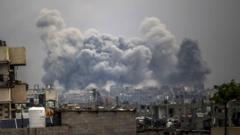**After weeks of stringent blockade, Israel will allow limited food supplies into Gaza while intensifying military operations.**
**Israel Eases Food Blockade on Gaza Amid Rising International Pressure, Says Netanyahu**

**Israel Eases Food Blockade on Gaza Amid Rising International Pressure, Says Netanyahu**
**Prime Minister’s decision comes after U.S. allies urge to prevent famine conditions in Gaza.**
Israel’s Prime Minister, Benjamin Netanyahu, announced the easing of a blockade on Gaza by permitting a "minimal" amount of food to enter the region, following pressures from U.S. allies in the Senate. In a video statement, he underscored the necessity of avoiding a famine in Gaza, which he viewed as essential from both diplomatic and humanitarian standpoints.
The announcement follows 11 weeks of blockade, during which Israel ceased all humanitarian and commercial deliveries to Gaza due to the ongoing conflict with Hamas. Netanyahu stated that food supplies would continue briefly until the military and U.S. corporations establish controlled aid distribution hubs—plans that have already faced skepticism and rejection from the UN.
Additionally, airstrikes by Israeli forces claimed at least 20 lives on the same day, with military reports indicating over 160 targets hit in a single day. The Israeli government also issued evacuation orders for Khan Younis and its eastern surrounding suburbs, anticipating a significant military offensive in those areas.
Resources within Gaza have dwindled significantly, as more than 3,000 casualties and 400,000 displacements have been reported since the last wave of military action began after a two-month ceasefire with Hamas earlier this year. The UN’s Integrated Food Security Phase Classification has raised alarms about severe food shortages affecting about half a million individuals in the territory.
Netanyahu faced critique from various cabinet members opposing the new food delivery policies, with National Security Minister Itamar Ben-Gvir labeling the decision a “grave mistake” that could fortify Hamas. The Prime Minister defended his choice as a strategic necessity, asserting that ensuring food supplies would help secure Israel’s victory over Hamas, while addressing humanitarian needs.
While nine lorries carrying food supplies were slated to enter Gaza on Monday, the Israeli military body responsible for crossings, Cogat, did not immediately confirm this action. Discussions between the UN and Israeli authorities regarding the logistics of limited aid delivery are currently underway, amidst resistance from humanitarian organizations concerning the proposed U.S.-Israeli aid approach.
As the conflict continues, major fighting persists within Gaza, with Netanyahu reiterating the goal of controlling all areas of the strip. He emphasized defeating Hamas as a means to facilitate the release of around 58 hostages, maintaining that ultimate success in the military campaign hinges on addressing the food crisis while pursuing military objectives.
The announcement follows 11 weeks of blockade, during which Israel ceased all humanitarian and commercial deliveries to Gaza due to the ongoing conflict with Hamas. Netanyahu stated that food supplies would continue briefly until the military and U.S. corporations establish controlled aid distribution hubs—plans that have already faced skepticism and rejection from the UN.
Additionally, airstrikes by Israeli forces claimed at least 20 lives on the same day, with military reports indicating over 160 targets hit in a single day. The Israeli government also issued evacuation orders for Khan Younis and its eastern surrounding suburbs, anticipating a significant military offensive in those areas.
Resources within Gaza have dwindled significantly, as more than 3,000 casualties and 400,000 displacements have been reported since the last wave of military action began after a two-month ceasefire with Hamas earlier this year. The UN’s Integrated Food Security Phase Classification has raised alarms about severe food shortages affecting about half a million individuals in the territory.
Netanyahu faced critique from various cabinet members opposing the new food delivery policies, with National Security Minister Itamar Ben-Gvir labeling the decision a “grave mistake” that could fortify Hamas. The Prime Minister defended his choice as a strategic necessity, asserting that ensuring food supplies would help secure Israel’s victory over Hamas, while addressing humanitarian needs.
While nine lorries carrying food supplies were slated to enter Gaza on Monday, the Israeli military body responsible for crossings, Cogat, did not immediately confirm this action. Discussions between the UN and Israeli authorities regarding the logistics of limited aid delivery are currently underway, amidst resistance from humanitarian organizations concerning the proposed U.S.-Israeli aid approach.
As the conflict continues, major fighting persists within Gaza, with Netanyahu reiterating the goal of controlling all areas of the strip. He emphasized defeating Hamas as a means to facilitate the release of around 58 hostages, maintaining that ultimate success in the military campaign hinges on addressing the food crisis while pursuing military objectives.





















